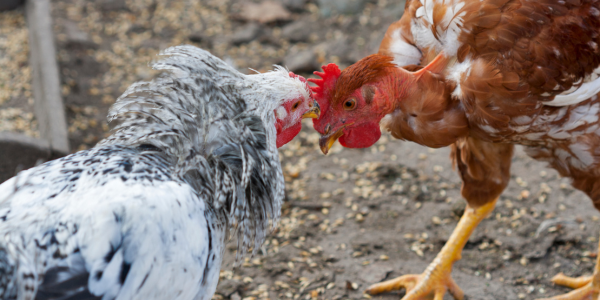Birds have a social hierarchy which is referred to as pecking order. Mild pecking is one of the main approaches in setting up of this order. Cannibalism, on the other hand, is a behavior in which birds aggressively peck one other to an extent of causing physical harm. can start with a few birds before spreading to the entire flock Cannibalism if not managed. Whereas this behavior is seen as an act of harassment between birds, cannibalism can result in the death of the injured birds. Many farmers do not understand what really causes cannibalism and how this behavior can be stopped. This article will highlight the major causes of cannibalism and how to prevent it.
Causes and prevention of cannibalism.
Overcrowding
If the spacing is inappropriate, birds tend to compete for resources which result in aggression among the birds. Birds of different ages have different space requirements. It is therefore important to ensure that birds have adequate space to avoid discomfort and stress which may be a prerequisite for cannibalism.
Inadequate laying nests
Hens tend to be aggressive if disturbed when laying. If the laying boxes are not enough, dominant hens will peck the weaker hens while competing for the laying nests. it is advisable to maintain a ratio of 4/5 hens per box. Too much light at the laying area can also encourage vent pecking. Reduce light in the laying area.
Nutritional deficiency
Research has shown that deficiency of protein, sodium, and phosphorus can cause cannibalism. Birds lacking these crucial nutrients may start by pecking feathers before escalating to serious body-harm causing behavior.
Inappropriate Light
Too much light is known to cause stress among birds. Excessive light can either be prolonged hours of light or too much lighting in the poultry house. Stressed birds can turn vengeance to their mates resulting in cannibalism. It is therefore important to ensure that proper lighting is always maintained in the poultry house.
Overheating
Just like inappropriate lighting, too much heat can cause stress in birds. Poor housing or prevailing weather conditions can cause overheating which can make birds feel uncomfortable. Uncomfortable birds are prone to pecking. Ensure that the temperature within the poultry house is maintained with the accepted range.
Abrupt changes
Birds like any other livestock get used to routine practices. If there are changes in management practices, birds can feel uncomfortable and retaliate by pecking their mates. Environmental changes often time induce stress in birds thus making them prone to pecking. In case management/environmental changes are inevitable, it is advisable to put extra effort in ensuring that the birds manage the change with minimal stress.
Inadequate food/water
Birds should always be provided with adequate water and food. Birds competing for either food or water will always fight for limited resources. It is advisable to hang weeds or vegetable which are rich in fibre to ensure that birds remain full and therefore eliminating the likelihood of pecking due to idleness or hunger.
Conclusion
Cannibalism if not managed can spread very fast to the entire flock. Whereas there are several causes that can cause pecking to escalate to serious levels, it is important to treat each case independently. Understanding the behavior your flock is crucial establishing the root cause cannibalism.


Здесь можно найти информация по запросу, включая подробные профили.
Реестры включают граждан любой возрастной категории, профессий.
Сведения формируются из открытых источников, подтверждая точность.
Обнаружение выполняется по фамилии, что делает использование эффективным.
глаз бога поиск людей
Помимо этого доступны места работы плюс актуальные данные.
Обработка данных проводятся в рамках правовых норм, что исключает разглашения.
Воспользуйтесь этому сайту, в целях получения нужные сведения максимально быстро.